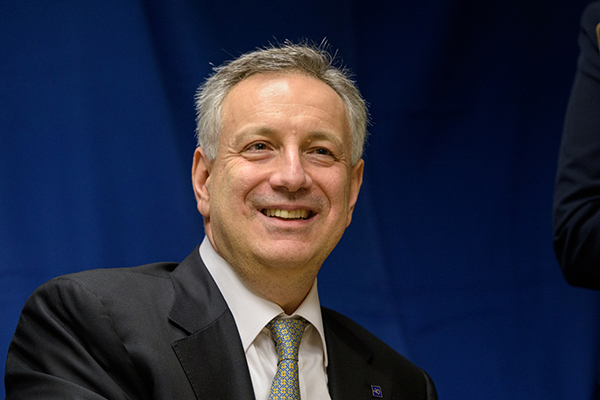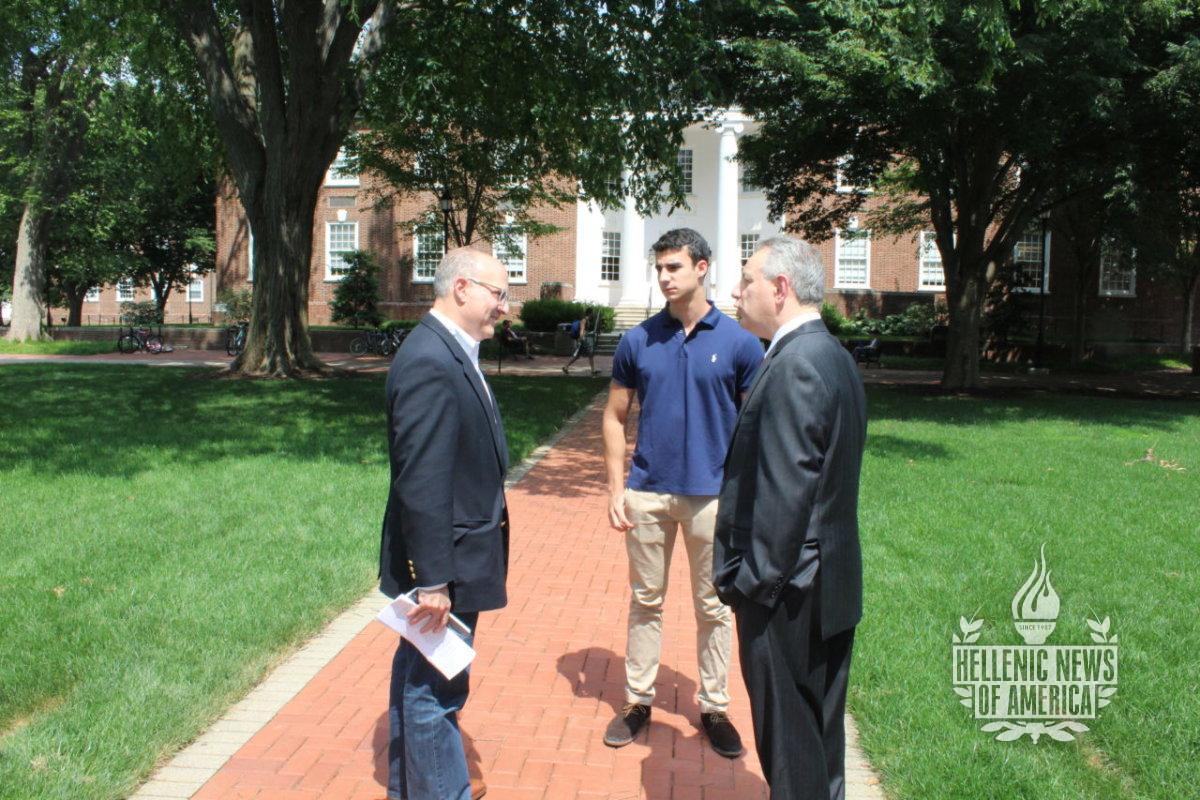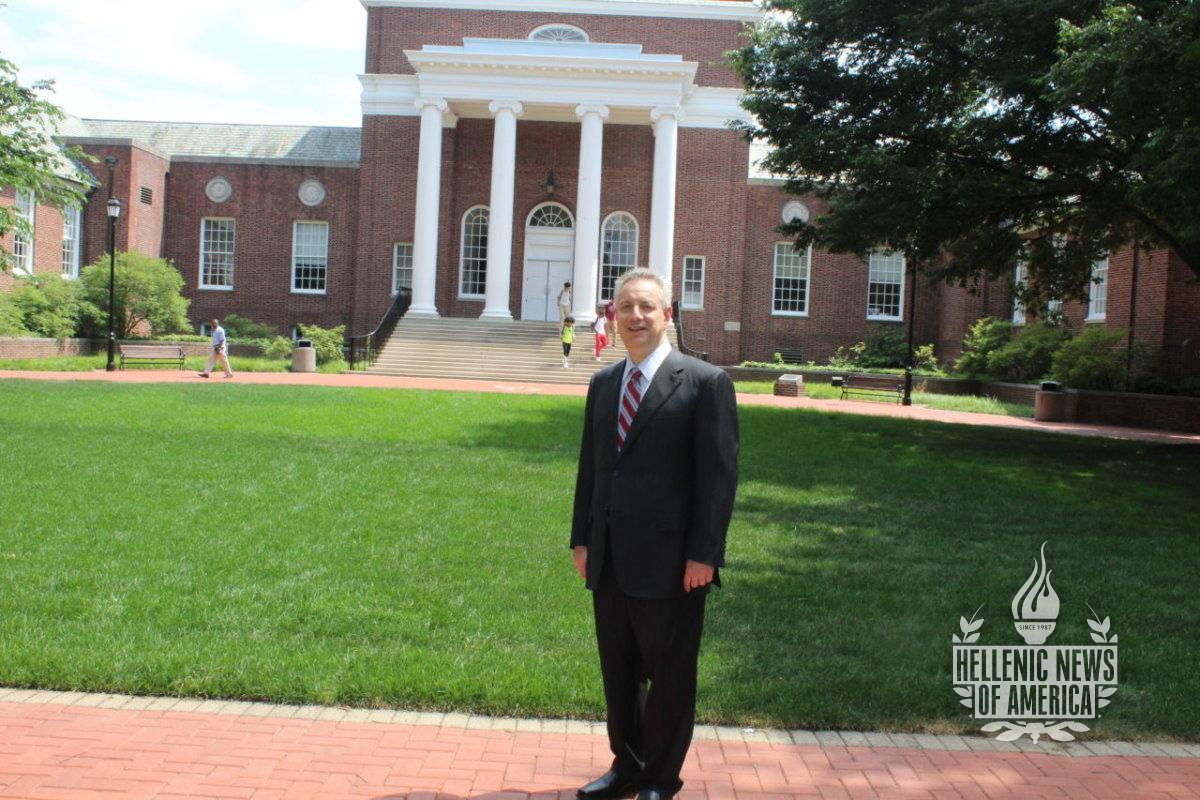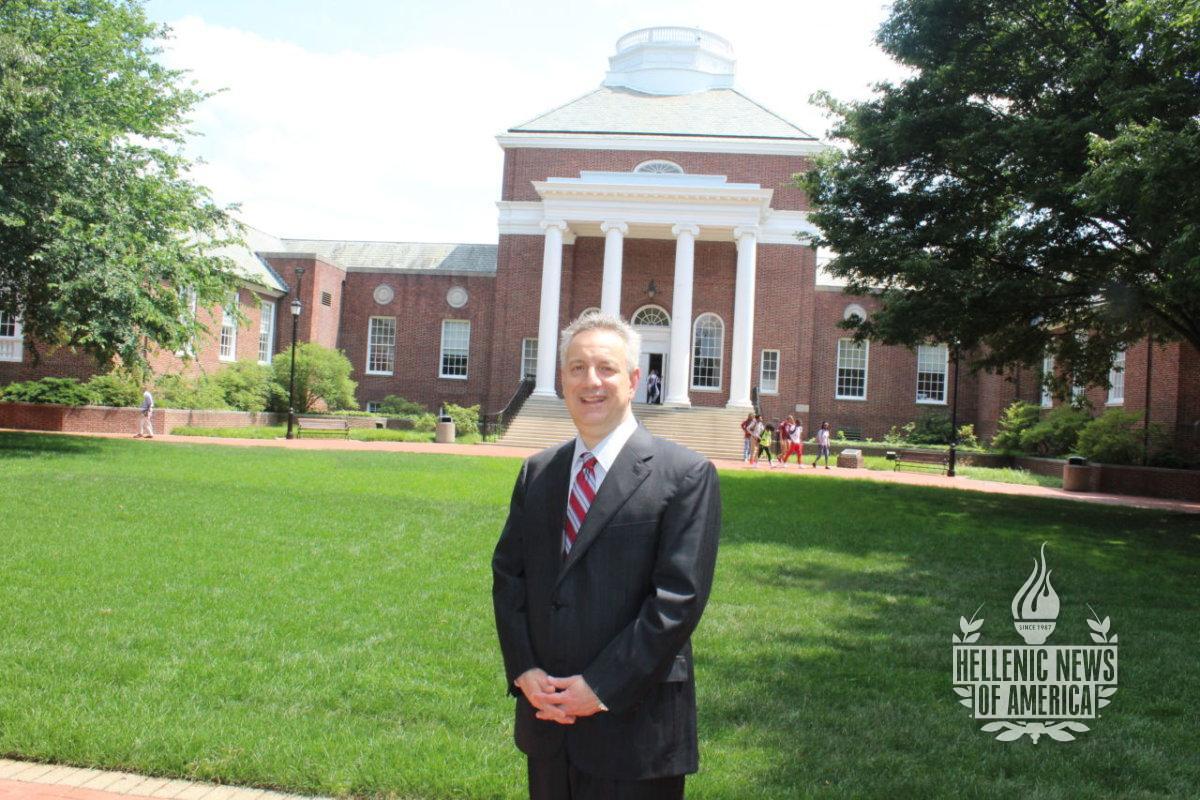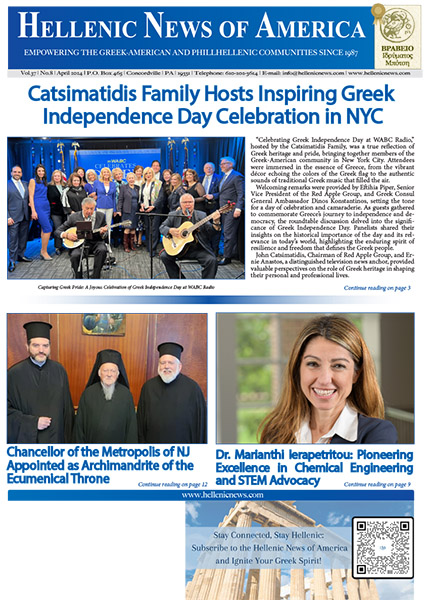By David Bjorkgren, Special to the Hellenic News of America
The University of Delaware has a lot to offer to so many different people. So marks the vision of the university’s new president, Dr. Dennis Assanis.
A Greek American, with a background in automotive engineering and energy systems, is ready to bring as many of us into the university’s fold as he can.
Dr. Assanis likes to use the phrase “inclusive excellence” when describing the Blue Hens campus he wants to see.
Inclusive excellence means building a more diverse campus. “The conversations become…so much more powerful when you have a rich and diverse community,” he says.
That means welcoming people with different backgrounds; different races, gender, ethnicity, socio-economic status, social orientation, religion and geography.
He compares it to ancient Greece and the open dialogue of Socrates and Plato.
“You want to do it because the academic community is all about the free exchange of ideas,” he says. Diverse groups produce better solutions.
“What is the product of the university? The product is intellectual citizens, people who think and go out and join the world and become the work force of the future. For our graduates to be successful in the global work place, which is very diverse, they need to have been exposed and experienced and inclusive environment at the university here on our own campus. Our campus needs to reflect the true society,” he says.
Dr. Assanis wants faculty, staff and students to challenge each other beyond their comfort zone to produce the best results. “We need to be challenged. To some extent, if we’re complacent nothing will ever change. Universities are about creative change—inspiration and change. It shouldn’t be about the status quo,” he says.
Faculty, staff and students already at the university have to cultivate the skills students bring to campus and move them to the next level.
“It’s not just about bringing in new people. It’s about working with the people we already have because these are going to be the mentors that lead the students to success in this environment of inclusive excellence,” he says.
Affordable education
Dr. Assanis believes no one should be marginalized because they can’t afford a college education. State funding of the university has been flat for a number of years but he feels there are entrepreneurial ways to generate academic revenue to make a University of Delaware education affordable.
There are corporate gifts, individual altruistic giving, revenue-generating research and revenue-generating academic programs.
“We have a major gift right now from one of those people who managed to get their education because of a gift from other philanthropic individuals, and who now wants to give back,” he says.
Research can lead to discoveries that translate to potential revenue for the university and for students, faculty and staff involved in the research.
Academic programs—work force education, online instruction, summer courses, and executive training, could all create revenue.
“It’s not just about tuition and enrollment. There’s more revenue streams that we can utilize,” he says.
Credentials
Dr. Assanis is the university’s 28th president. He was elected Nov. 18, 2015 by unanimous vote of the university’s board of trustees, chosen for his administrative experience and academic credentials. He assumed the post officially on June 6.
His worldwide reputation as a scholar precedes him. He is a 25-year researcher of internal combustion engines, fuels and energies. He directed $100 million in research grants and contracts and holds five patents. In 2008, he was inducted as a member of the National Academy of Engineers for scientific contributions to improving fuel economy and reducing engine emissions.
Dr. Assanis previously served as provost and senior vice president for academic affairs at Stony Brook University in New York and as vice president for Brookhaven National Laboratory Affairs, both since 2011.
Prior to his career at Stony Brook, Dr. Assanis had a 17-year career at the University of Michigan. He was the Jon R. and Beverly S. Holt Professor of Engineering and Arthur F. Thurnau Professor, as well as director of the Michigan Memorial Phoenix Energy Institute, founding director of the U.S.-China Clean Energy Research Center for Clean Vehicles and director of the Walter E. Lay Automotive Laboratory.
He has also served as the founding director of the interdisciplinary graduate program in automotive engineering (1996-2002), chair of the Department of Mechanical Engineering (2002-07), director of the Automotive Research Center (2002-09), and founding co-director of the General Motors-University of Michigan Collaborative Research Laboratory for Advanced Engine Systems (2002-11). Assanis started his academic career as an assistant and associate professor at the University of Illinois at Urbana Champaign.
Since 2009, Assanis has been honorary president and honorary professor at Zhejiang Automotive Engineering Institute and advisory professor at Shanghai Jiao Tong University, both in China. He paved the way for Stony Brook to offer degrees in South Korea, at the Songdo Global University Campus.
While at Stony Brook he helped grow STEM (science, technology, engineering and mathematics) programs, used clustered hiring initiatives to create an interdisciplinary faculty structure; reinvigorated the role of arts, humanities and social sciences; strengthened collaborations, particularly in the private and government sectors; supported economically disadvantaged and underrepresented students and championed a $20 million fundraiser to create an endowed Institute for advanced Computational Science for interdisciplinary research.
He was named a Distinguished Professor in 2015, while still at Stony Brook, from the State University of New York for achieving international and national prominence in the field of mechanical and automotive engineering.
Partnerships
Dr. Assanis is a big proponent of collaboration. When he was at the University of Michigan, in close proximity to automotive companies, they created a master’s degree program in automotive engineering.
“It sounds like a no-brainer,” he says. “Within four years, it was the most successful master’s program in the university’s history.” The degree was perfect for those working in the automobile industry who wanted to move to the next level in their careers, to become managers and lead teams.
They formed a partnership between the university and one of the automobile manufacturers to create innovative vehicle design. Dr. Assanis posed the idea to the auto company executives as if the students of the university were an extension of the company’s research team. “Give me the two things that you’ll never farm out to anybody else. I want to partner with you, research and do advanced R&D,” he told them. They agreed to let the university focus on the vehicle power trains and bodies.
“We started with one collaborative research lab. They were funding us at the university for five years. Before too long, they had 12 of those types of models world-wide,” he says. “They liked it so much it became part of the corporate model.”
Now he’s working on collaborations at the University of Delaware.
“Bring the industry, bring the community, and bring the entrepreneurs. Get them engaged. Become the innovation engine for the state of Delaware.“
He pauses for a moment, than broadens his collaborative vision to include Philadelphia, parts of New Jersey and parts of Maryland. “Anything within a hundred miles and beyond, we can really foster some new partnerships.”
Hidden treasures
The university, with its nearly 23,000 students, offers 150 fields of study and is one of the top 10 universities in chemical engineering.
Dr. Assanis embraces the university’s successes but people need to know the university excels in more than just chemical engineering.
“When I first arrived everybody was telling me that the University of Delaware has had a rich tradition in chemical engineering. At some point in time, it could have been the duPont University.”
But you quickly discover it has the world’s best physical therapy program.
“You find this crown jewel which is called art conservation, which brings together art and chemistry and chemical engineering and material science, an unbelievable program that restores damaged paintings and art work.”
“Then you find a wonderful criminal justice program and a wonderful hotel management program, which can easily be top five”, he says.
The university performs $200 million in sponsored research, including a partnership with the U.S. Department of Energy in alternative energy research. It has the oldest solar energy program in the country, around since the 1970s, and continues to work on wind energy projects.
There is a university agricultural program that has its own poultry, dairy cows, plants and creamery.
The university where Vice President Joseph Biden graduated, has students from 97 different countries and launched America’s first study abroad program in 1923.
“So we have more than one thing,” Dr. Assanis says. “Everywhere you turn, we are extremely good or excellent at this.”
He’d like to take the university to the next level. If it is very good at something, he wants to become excellent at it. If it’s already excellent at something, the university should become pre-eminent in that field. He also wants to continue to innovate with education, finding new ways to teach and learn.
“That’s kind of my operating philosophy,” he says.
Background
Dr. Assanis has spent the last 35 years in the United States and is a U.S. citizen. A native of Greece, he initially traveled to the United Kingdom to study marine engineering, receiving his BS degree with distinction in Marine Engineering in 1980 from Newcastle University in England.
He came to the United States, earning four degrees from the Massachusetts Institute of Technology: an MS in Naval Architecture and Marine Engineering and an MS in Mechanical Engineering, both in 1982; an MS in Management from Sloan School of Management in 1986, and a Doctorate in Power and Propulsion in 1985.
His wife is Eleni Assanis, president of the consulting company, Assanis & Associates. They have two adult sons, Nicholas and Dimitris.
Greek ties
There are at least eight professors at the University of Delaware with a Greek background. Many students also have Greek or Greek American backgrounds.
Dr. Assanis cautions that it’s too early for him to say if a Hellenic studies program would be possible at the University of Delaware, but he’s excited by the possibilities, if the support were there.
There is educational value in offering Hellenic studies, he says, particularly if it goes beyond language studies to include education, history, philosophy, theater and social studies.
“We could be doing amazing things with a study abroad in Greece,” he suggests.
In May, a team from the university’s College of Education and Human Development visited the University of Patras and the University of Athens in Greece, according to an article on the university website. The faculty took steps to establish a partnership with two Greek universities and an international school in Athens to foster international collaboration in early childhood education and teacher education.
There could be other tie-ins to Greece, Dr. Assanis says, a broader study that could look at the economy of the European Union and the changes taking place in that part of the world.
“Let’s say an economist was interested in what’s happening in Europe right now. You’re thinking of what’s happening now with nations like Britain pulling out of the European Economic Union. Who knows which country would be next, it might be Greece, Portugal, Spain…,” he says. “You could see students from all over the world coming to study those areas. A chair in European studies could be the focal point for such studies.”
Another tie-in to Greece could come through the university’s successful hospitality business management studies.
“One of the strongest industries in Greece right now is hotel management and tourism. So our programs should be very attractive to Greeks with that interest and background
.




